Impact Functions¶
Impact functions relate the hazard intensity to a percentage of damage in the exposure. Every hazard and exposure type are characterized by an impact function. Single impact functions are defined using the class ImpactFunc and they are gathered in a container of type ImpactFuncSet.
ImpactFunc class¶
Contains the definition of one impact function. Attributes: * haz_type (str): hazard type acronym (e.g. ‘TC’) * id (int or str): id of the impact function. Exposures of the same type will refer to the same impact function id * name (str): name of the impact function * intensity_unit (str): unit of the intensity * intensity (np.array): intensity values * mdd (np.array): mean impact degree for each intensity (numbers in [0,1]) * paa (np.array): percentage of affected assets (exposures) for each intensity (numbers in [0,1])
After defining an impact function, use its check() method to check that the attributes have been set correctly. The calc_mdr() method will be used to compute the Mean Damage Ratio (mdr = mdd * paa) of the exposures at each point.
[1]:
%matplotlib inline
import numpy as np
from climada.entity import ImpactFunc
imp_fun = ImpactFunc()
imp_fun.haz_type = 'TC'
imp_fun.id = 3
imp_fun.name = 'TC Building code'
imp_fun.intensity_unit = 'm/s'
imp_fun.intensity = np.linspace(0, 100, num=15)
imp_fun.mdd = np.sort(np.random.rand(15))
imp_fun.paa = np.sort(np.random.rand(15))
imp_fun.check()
print('Mean damage ratio at intensity 18.7: ', imp_fun.calc_mdr(18.7))
# plot impact function
imp_fun.plot()
2019-05-15 07:57:31,779 - climada - DEBUG - Loading default config file: /Users/aznarsig/Documents/Python/climada_python/climada/conf/defaults.conf
Mean damage ratio at intensity 18.7: 0.010130888584982699
[1]:
(<Figure size 288x288 with 1 Axes>,
[<matplotlib.axes._subplots.AxesSubplot at 0x1a1f5d32b0>])
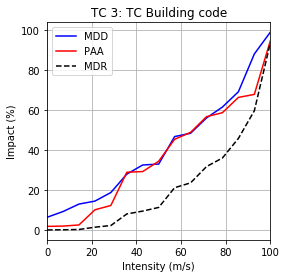
Derivated classes of ImpactFunc define different types of impact functions, as for example the tropical cyclones winds in IFTropCyclone:
[2]:
from climada.entity import IFTropCyclone
if_tc = IFTropCyclone()
if_tc.set_emanuel_usa()
if_tc.plot()
[2]:
(<Figure size 288x288 with 1 Axes>,
[<matplotlib.axes._subplots.AxesSubplot at 0x1a1f8eb710>])
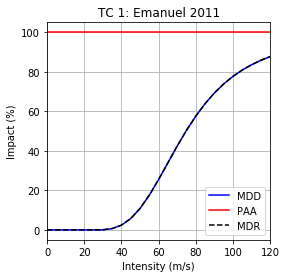
ImpactFuncSet class¶
ImpactFuncSet is a container which handles impact functions of type ImpactFunc. An impact function can be added and removed using the methods add_func() and remove_func() respectively. Impact functions can be retrieved using the impact get_func(). Use the check() method to make sure that the impact functions have been properly set.
ImpactFuncSet contains the attribute tag of type Tag, which stores information about the data: the original file name and a description.
[3]:
from climada.entity import ImpactFuncSet
help(ImpactFuncSet)
Help on class ImpactFuncSet in module climada.entity.impact_funcs.impact_func_set:
class ImpactFuncSet(builtins.object)
| Contains impact functions of type ImpactFunc. Loads from
| files with format defined in FILE_EXT.
|
| Attributes:
| tag (Tag): information about the source data
| _data (dict): contains ImpactFunc classes. It's not suppossed to be
| directly accessed. Use the class methods instead.
|
| Methods defined here:
|
| __init__(self)
| Empty initialization.
|
| Examples:
| Fill impact functions with values and check consistency data:
|
| >>> fun_1 = ImpactFunc()
| >>> fun_1.haz_type = 'TC'
| >>> fun_1.id = 3
| >>> fun_1.intensity = np.array([0, 20])
| >>> fun_1.paa = np.array([0, 1])
| >>> fun_1.mdd = np.array([0, 0.5])
| >>> imp_fun = ImpactFuncSet()
| >>> imp_fun.append(fun_1)
| >>> imp_fun.check()
|
| Read impact functions from file and checks consistency data.
|
| >>> imp_fun = ImpactFuncSet()
| >>> imp_fun.read(ENT_TEMPLATE_XLS)
|
| append(self, func)
| Append a ImpactFunc. Overwrite existing if same id and haz_type.
|
| Parameters:
| func (ImpactFunc): ImpactFunc instance
|
| Raises:
| ValueError
|
| check(self)
| Check instance attributes.
|
| Raises:
| ValueError
|
| clear(self)
| Reinitialize attributes.
|
| extend(self, impact_funcs)
| Append impact functions of input ImpactFuncSet to current
| ImpactFuncSet. Overwrite ImpactFunc if same id and haz_type.
|
| Parameters:
| impact_funcs (ImpactFuncSet): ImpactFuncSet instance to extend
|
| Raises:
| ValueError
|
| get_func(self, haz_type=None, fun_id=None)
| Get ImpactFunc(s) of input hazard type and/or id.
| If no input provided, all impact functions are returned.
|
| Parameters:
| haz_type (str, optional): hazard type
| fun_id (int, optional): ImpactFunc id
|
| Returns:
| ImpactFunc (if haz_type and fun_id),
| list(ImpactFunc) (if haz_type or fun_id),
| {ImpactFunc.haz_type: {ImpactFunc.id : ImpactFunc}} (if None)
|
| get_hazard_types(self, fun_id=None)
| Get impact functions hazard types contained for the id provided.
| Return all hazard types if no input id.
|
| Parameters:
| fun_id (int, optional): id of an impact function
|
| Returns:
| list(str)
|
| get_ids(self, haz_type=None)
| Get impact functions ids contained for the hazard type provided.
| Return all ids for each hazard type if no input hazard type.
|
| Parameters:
| haz_type (str, optional): hazard type from which to obtain the ids
|
| Returns:
| list(ImpactFunc.id) (if haz_type provided),
| {ImpactFunc.haz_type : list(ImpactFunc.id)} (if no haz_type)
|
| plot(self, haz_type=None, fun_id=None)
| Plot impact functions of selected hazard (all if not provided) and
| selected function id (all if not provided).
|
| Parameters:
| haz_type (str, optional): hazard type
| fun_id (int, optional): id of the function
|
| Returns:
| matplotlib.figure.Figure, [matplotlib.axes._subplots.AxesSubplot]
|
| read_excel(self, file_name, description='', var_names={'sheet_name': 'impact_functions', 'col_name': {'func_id': 'impact_fun_id', 'inten': 'intensity', 'mdd': 'mdd', 'paa': 'paa', 'name': 'name', 'unit': 'intensity_unit', 'peril': 'peril_id'}})
| Read excel file following template and store variables.
|
| Parameters:
| file_name (str): absolute file name
| description (str, optional): description of the data
| var_names (dict, optional): name of the variables in the file
|
| read_mat(self, file_name, description='', var_names={'sup_field_name': 'entity', 'field_name': 'damagefunctions', 'var_name': {'fun_id': 'DamageFunID', 'inten': 'Intensity', 'mdd': 'MDD', 'paa': 'PAA', 'name': 'name', 'unit': 'Intensity_unit', 'peril': 'peril_ID'}})
| Read MATLAB file generated with previous MATLAB CLIMADA version.
|
| Parameters:
| file_name (str): absolute file name
| description (str, optional): description of the data
| var_names (dict, optional): name of the variables in the file
|
| remove_func(self, haz_type=None, fun_id=None)
| Remove impact function(s) with provided hazard type and/or id.
| If no input provided, all impact functions are removed.
|
| Parameters:
| haz_type (str, optional): all impact functions with this hazard
| fun_id (int, optional): all impact functions with this id
|
| size(self, haz_type=None, fun_id=None)
| Get number of impact functions contained with input hazard type and
| /or id. If no input provided, get total number of impact functions.
|
| Parameters:
| haz_type (str, optional): hazard type
| fun_id (int, optional): ImpactFunc id
|
| Returns:
| int
|
| write_excel(self, file_name, var_names={'sheet_name': 'impact_functions', 'col_name': {'func_id': 'impact_fun_id', 'inten': 'intensity', 'mdd': 'mdd', 'paa': 'paa', 'name': 'name', 'unit': 'intensity_unit', 'peril': 'peril_id'}})
| Write excel file following template.
|
| Parameters:
| file_name (str): absolute file name to write
| var_names (dict, optional): name of the variables in the file
|
| ----------------------------------------------------------------------
| Data descriptors defined here:
|
| __dict__
| dictionary for instance variables (if defined)
|
| __weakref__
| list of weak references to the object (if defined)
[4]:
# build impact functions
import numpy as np
import matplotlib.pyplot as plt
from climada.entity import ImpactFunc, ImpactFuncSet
imp_fun_1 = ImpactFunc()
imp_fun_1.haz_type = 'TC'
imp_fun_1.id = 1
imp_fun_1.name = 'TC Default'
imp_fun_1.intensity_unit = 'm/s'
imp_fun_1.intensity = np.linspace(0, 100, num=5)
imp_fun_1.mdd = np.sort(np.random.rand(5))
imp_fun_1.paa = np.sort(np.random.rand(5))
imp_fun_3 = ImpactFunc()
imp_fun_3.haz_type = 'TC'
imp_fun_3.id = 3
imp_fun_3.name = 'TC Building code'
imp_fun_3.intensity_unit = 'm/s'
imp_fun_3.intensity = np.linspace(0, 100, num=15)
imp_fun_3.mdd = np.sort(np.random.rand(15))
imp_fun_3.paa = np.sort(np.random.rand(15))
# fill ImpactFuncSet
if_set = ImpactFuncSet()
if_set.append(imp_fun_1)
if_set.append(imp_fun_3)
# plots can be modified using matplotlib as follows:
fig, axes = if_set.plot()
axes[0].get_shared_y_axes().join(axes[0], axes[1])
axes[0].set_title('Setting title 1')
axes[1].set_yticklabels([])
axes[1].set_ylabel('')
axes[1].set_title('Setting title 2')
fig.suptitle('Tropical Cyyclone impact functions')
plt.tight_layout()
plt.subplots_adjust(top=0.85)
# select impact functions
if_tc_1 = if_set.get_func('TC', 1)
if_tc_1.plot()
# remove impact function of id 3 and type TC
if_set.remove_func('TC', 3)
if_set.plot()
[4]:
(<Figure size 288x288 with 1 Axes>,
[<matplotlib.axes._subplots.AxesSubplot at 0x1a1f39a0b8>])
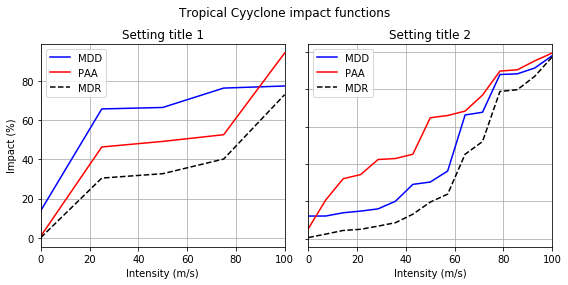
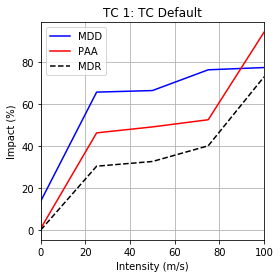
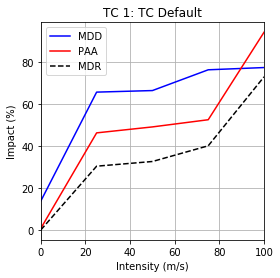
Read impact functions of an Excel file¶
Impact functions defined in an excel file following the template provided in sheet impact_functions of climada_python/data/system/entity_template.xlsx can be ingested directly using the method read_excel().
[5]:
from climada.entity import ImpactFuncSet
from climada.util import ENT_TEMPLATE_XLS
# Fill DataFrame from Excel file
file_name = ENT_TEMPLATE_XLS # provide absolute path of the excel file
imp_set = ImpactFuncSet()
imp_set.read_excel(file_name)
print('Read file:', imp_set.tag.file_name)
imp_set.plot() # plot all impact functions
Read file: /Users/aznarsig/Documents/Python/climada_python/data/system/entity_template.xlsx
[5]:
(<Figure size 288x864 with 11 Axes>,
[<matplotlib.axes._subplots.AxesSubplot at 0x1a1f405ac8>,
<matplotlib.axes._subplots.AxesSubplot at 0x1a1f45c5f8>,
<matplotlib.axes._subplots.AxesSubplot at 0x1a1f43a7f0>,
<matplotlib.axes._subplots.AxesSubplot at 0x1a1fb5c278>,
<matplotlib.axes._subplots.AxesSubplot at 0x1a1fd4df60>,
<matplotlib.axes._subplots.AxesSubplot at 0x1a1fd0a710>,
<matplotlib.axes._subplots.AxesSubplot at 0x1a1fcffba8>,
<matplotlib.axes._subplots.AxesSubplot at 0x1a1fe08c88>,
<matplotlib.axes._subplots.AxesSubplot at 0x1a1fe55a20>,
<matplotlib.axes._subplots.AxesSubplot at 0x1a1fcf7eb8>,
<matplotlib.axes._subplots.AxesSubplot at 0x1a1fec1da0>])
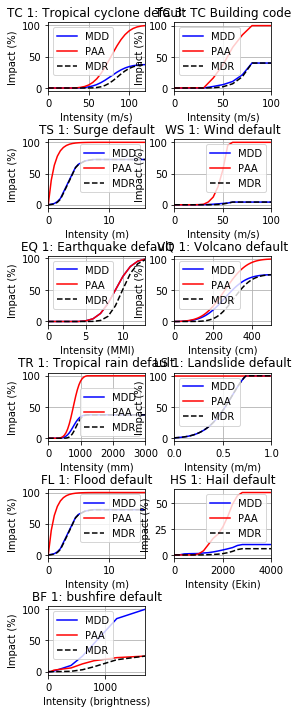
Write impact functions¶
Impact functions can be writen in Excel format using write_excel() method.
[6]:
from climada.entity import ImpactFuncSet
from climada.util import ENT_TEMPLATE_XLS
# Fill DataFrame from Excel file
file_name = ENT_TEMPLATE_XLS # provide absolute path of the excel file
imp_set = ImpactFuncSet()
imp_set.read_excel(file_name)
# write file
imp_set.write_excel('tutorial_if_set.xlsx')
Pickle can always be used as well:
[7]:
from climada.util.save import save
# this generates a results folder in the current path and stores the output there
save('tutorial_if_set.p', imp_set)
2019-05-15 07:57:36,403 - climada.util.save - INFO - Written file /Users/aznarsig/Documents/Python/climada_python/doc/tutorial/results/tutorial_if_set.p